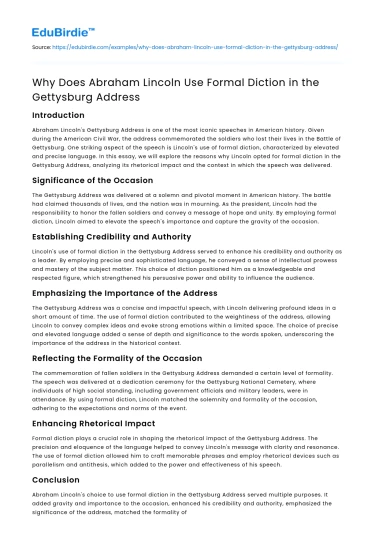Introduction
Abraham Lincoln's Gettysburg Address is one of the most iconic speeches in American history. Given during the American Civil War, the address commemorated the soldiers who lost their lives in the Battle of Gettysburg. One striking aspect of the speech is Lincoln's use of formal diction, characterized by elevated and precise language. In this essay, we will explore the reasons why Lincoln opted for formal diction in the Gettysburg Address, analyzing its rhetorical impact and the context in which the speech was delivered.
Significance of the Occasion
The Gettysburg Address was delivered at a solemn and pivotal moment in American history. The battle had claimed thousands of lives, and the nation was in mourning. As the president, Lincoln had the responsibility to honor the fallen soldiers and convey a message of hope and unity. By employing formal diction, Lincoln aimed to elevate the speech's importance and capture the gravity of the occasion.
Save your time!
We can take care of your essay
- Proper editing and formatting
- Free revision, title page, and bibliography
- Flexible prices and money-back guarantee
Establishing Credibility and Authority
Lincoln's use of formal diction in the Gettysburg Address served to enhance his credibility and authority as a leader. By employing precise and sophisticated language, he conveyed a sense of intellectual prowess and mastery of the subject matter. This choice of diction positioned him as a knowledgeable and respected figure, which strengthened his persuasive power and ability to influence the audience.
Emphasizing the Importance of the Address
The Gettysburg Address was a concise and impactful speech, with Lincoln delivering profound ideas in a short amount of time. The use of formal diction contributed to the weightiness of the address, allowing Lincoln to convey complex ideas and evoke strong emotions within a limited space. The choice of precise and elevated language added a sense of depth and significance to the words spoken, underscoring the importance of the address in the historical context.
Reflecting the Formality of the Occasion
The commemoration of fallen soldiers in the Gettysburg Address demanded a certain level of formality. The speech was delivered at a dedication ceremony for the Gettysburg National Cemetery, where individuals of high social standing, including government officials and military leaders, were in attendance. By using formal diction, Lincoln matched the solemnity and formality of the occasion, adhering to the expectations and norms of the event.
Enhancing Rhetorical Impact
Formal diction plays a crucial role in shaping the rhetorical impact of the Gettysburg Address. The precision and eloquence of the language helped to convey Lincoln's message with clarity and resonance. The use of formal diction allowed him to craft memorable phrases and employ rhetorical devices such as parallelism and antithesis, which added to the power and effectiveness of his speech.
Conclusion
Abraham Lincoln's choice to use formal diction in the Gettysburg Address served multiple purposes. It added gravity and importance to the occasion, enhanced his credibility and authority, emphasized the significance of the address, matched the formality of the event, and contributed to the rhetorical impact of the speech. By employing precise and elevated language, Lincoln captured the attention and emotions of his audience, leaving a lasting impression on the collective memory of the nation. The formal diction used in the Gettysburg Address remains a testament to Lincoln's skill as a communicator and his ability to inspire and unite a divided nation.






 Stuck on your essay?
Stuck on your essay?

